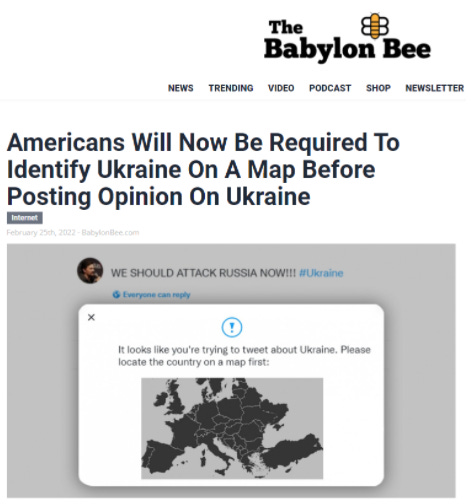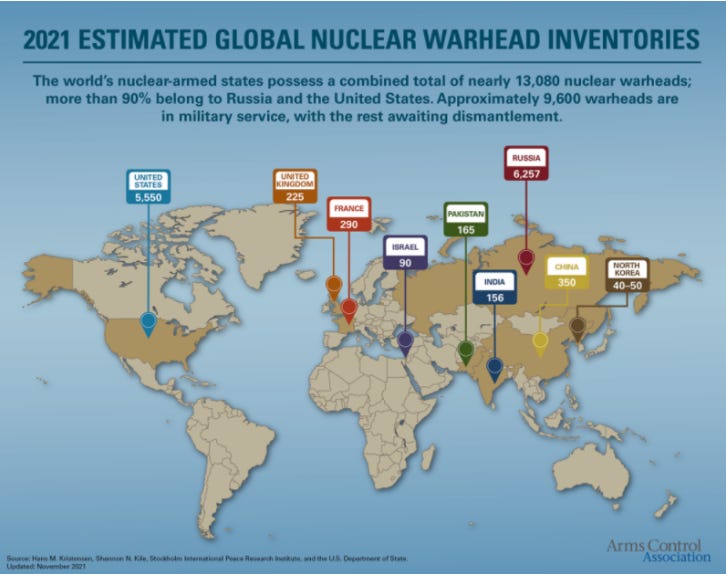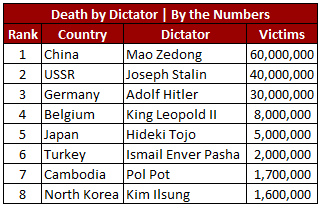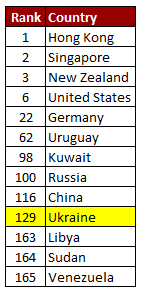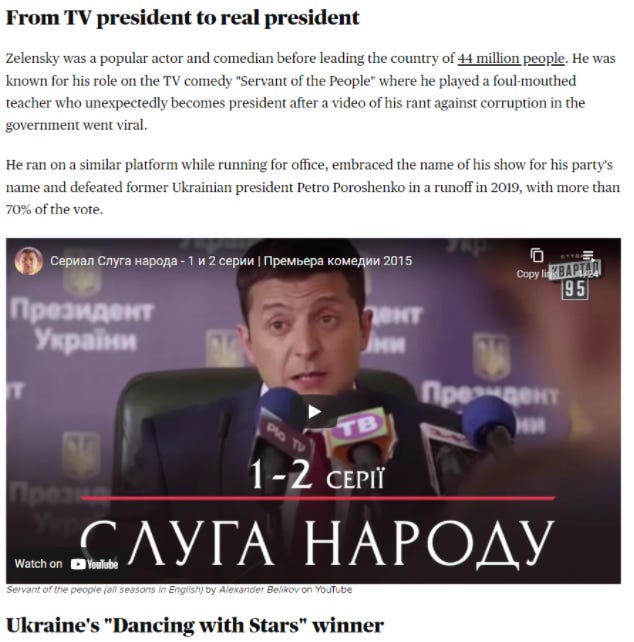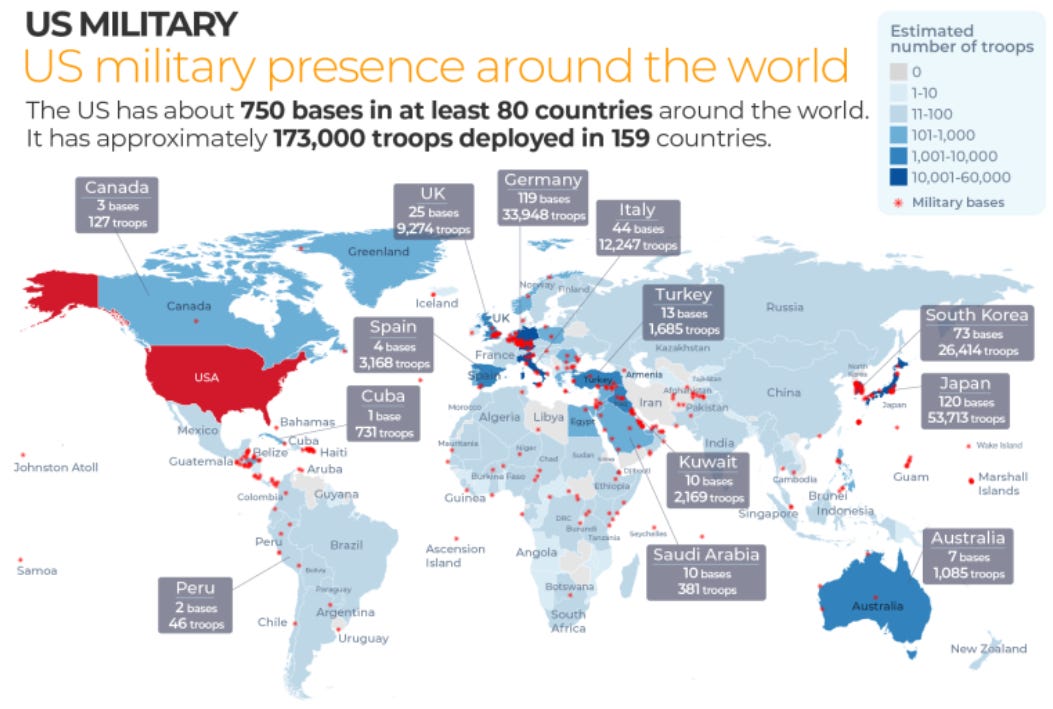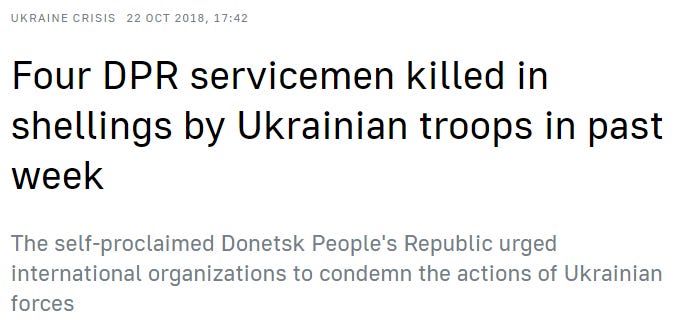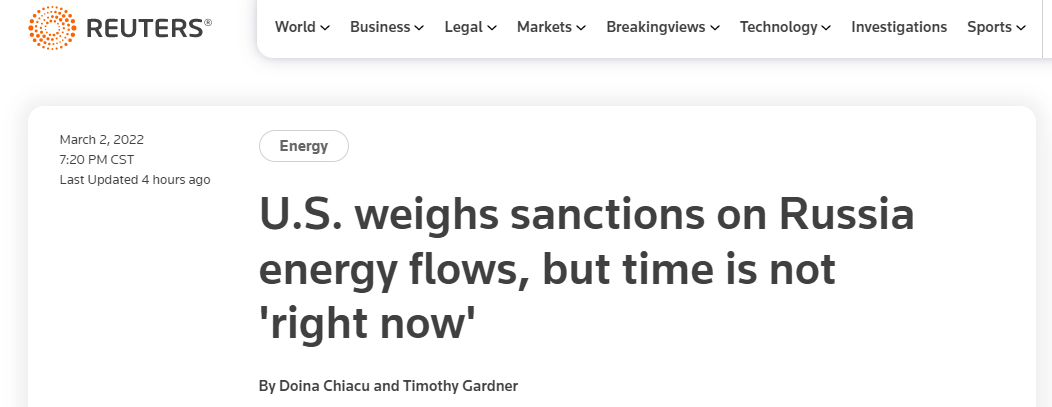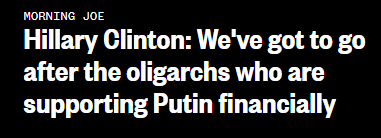NATO, Ukraine, and Russia

“It’s long been said that war is nature’s way of teaching Americans geography.” - Doug Casey
“It ain’t what you don’t know that gets you into trouble. It’s what you know for sure that just ain’t so.” - Mark Twain
Ask anyone worth his salt and he’ll agree: context matters. Indeed, it’s a hard position to take in our current environment, but I will make the following three arguments: (1) neither the Ukrainian government is ‘the good guy’ nor is the Russian government ‘the bad guy,’ (2) Vladimir Putin is not the evilest human being since Adolf Hitler, and (3) there is a whole lot more to the story than what you have seen on Twitter or CNN. Really, the manner in which you view this current conflict between Russia and Ukraine boils down to the way in which you view the role of the United States in the world.
Nuclear Weapons
It’s understandable to worry about nuclear weapons. They are civilization-ending weapons, and they are held by only a few countries in the world. Something to ponder: which is the one government in world history that has actually used nuclear weapons, or “Weapons of Mass Destruction,” in war? The United States. In 1945, within 4 days, two nuclear weapons were detonated by the U.S. military over Hiroshima and Nagasaki, killing around 200,000 Japanese.
Below is a graphic from November 2021, showing estimates of the world’s nuclear arsenal:
History’s Murderous Tyrants
If you shudder at the mention of Vladimir Putin, or at the sound of the Russian language, then we can at least confirm that Western propaganda over many, many years — thanks Hollywood and CNN — has succeeded. It’s easier to point to cultural differences when making emotional arguments rather than sticking to facts, logic, and reason:
“When we look for people to blame, we blame foreigners first -- different language, skin... their food smells bad & they smell bad.” - Jim Rogers, Street Smarts
Let’s instead revisit some uncomfortable aspects of rather recent history.
Democide: the intentional killing of an unarmed or disarmed person by government agents acting in their authoritative capacity and pursuant to government policy or high command
In the 19th and 20th century, the world was exposed to some truly murderous regimes:
Not to downplay the current skirmish in Ukraine, but after almost two weeks of activity — and endless coverage (propaganda) by the news — the United Nations reports 331 Ukrainian civilian deaths. Obviously this is 331 too many, but it is important to discuss real facts and figures, rather than hear from emotional news anchors and watch carefully-curated footage.
NATO and the Quest for Freedom
Opening text from the April 4, 1949 North Atlantic Treaty:
The Parties to this Treaty reaffirm their faith in the purposes and principles of the Charter of the United Nations and their desire to live in peace with all peoples and all governments.
They are determined to safeguard the freedom, common heritage and civilisation of their peoples, founded on the principles of democracy, individual liberty and the rule of law. They seek to promote stability and well-being in the North Atlantic area.
They are resolved to unite their efforts for collective defence and for the preservation of peace and security.
A few observations from the text above:
“common heritage” - Is this… acceptable today? Is this politically-correct?
“democracy” - a.k.a. people-authored legislation, a.k.a. mob rule
“individual liberty” - Fantastic that this was included, but tragic that it’s been totally ignored
Well, it is worth exploring how some of the countries of the world stack up against one another in terms of “freedom” and “the principles of democracy, individual liberty and the rule of law.” Thankfully, in the 21st century, we have many, many people and organizations in the world who find this topic of particular interest. Canada’s Fraser Institute publishes the annual Economic Freedom of the World index. This index ranks each country based on five criteria: (1) size of government, (2) legal system and property rights, (3) sound money, (4) freedom to trade internationally, and (5) regulation. The table below, with just a few selections, is illustrative of how open and free the countries of the world are (Note 1: countries with insufficient data are excluded from the dataset; Note 2: this is data through 2019 — to me this suggests that the next publication of this index will look rather different once the Covid-19 responses are factored into the equation):
Putin’s Goals
In the same manner that it makes sense to actually read the reasons for Osama bin Laden organizing the attack on 9/11, it makes sense to actually read the reasons for President Putin entering Ukraine last week (translated from his televised address, emphasis my own):
“It is a fact that over the past 30 years we have been patiently trying to come to an agreement with the leading NATO countries regarding the principles of equal and indivisible security in Europe. In response to our proposals, we invariably faced either cynical deception and lies or attempts at pressure and blackmail, while the North Atlantic alliance continued to expand despite our protests and concerns. Its military machine is moving and, as I said, is approaching our very border.”
“Anything that does not suit the dominant state, the powers that be, is denounced as archaic, obsolete and useless. At the same time, everything it [The United States] regards as useful is presented as the ultimate truth and forced on others regardless of the cost, abusively and by any means available. Those who refuse to comply are subjected to strong-arm tactics.”
“To reiterate: they have deceived us, or, to put it simply, they have played us. Sure, one often hears that politics is a dirty business. It could be, but it shouldn’t be as dirty as it is now, not to such an extent. This type of con-artist behaviour is contrary not only to the principles of international relations but also and above all to the generally accepted norms of morality and ethics. Where is justice and truth here? Just lies and hypocrisy all around.”
“Any further expansion of the North Atlantic alliance’s infrastructure or the ongoing efforts to gain a military foothold of the Ukrainian territory are unacceptable for us. Of course, the question is not about NATO itself. It merely serves as a tool of US foreign policy.”
First, a pithy observation on the current paranoia:
“The people who get hysterical about global warming are the same people who got hysterical about Covid and will get hysterical about the next Covid and are currently hysterical about Ukraine as being the most important country in the world. It’s the same personality type. It’s actually the same group of people.” - Doug Casey
Second, since in Putin’s address to Russians and Ukrainians he mentioned the ongoing eastern creep of NATO, it makes sense to fact-check him on this. After all, Putin and “Russia” are the ones being accused by the United States, the United Nations, and NATO of trying to reestablish the U.S.S.R. a la Hitler territorial acquisition. The following two maps show the buffer between Western Europe and Russia shrink as NATO expanded over 70 years:
NATO, 1950
NATO, 2020
On NATO’s expansion in 1999 (+ Czech Republic, Hungary, and Poland):
“I think the Russians will gradually react quite adversely and it will affect their policies. I think it is a tragic mistake. There was no reason for this whatsoever. No one was threatening anybody else. This expansion would make the Founding Fathers of this country turn over in their graves. We have signed up to protect a whole series of countries, even though we have neither the resources nor the intention to do so in any serious way. [NATO expansion] was simply a light-hearted action by a Senate that has no real interest in foreign affairs.” - George F. Kennan, diplomat and creator of the concept of “containment” of the Soviet Union
Double-Standards
Since Putin recognized the independence of Donetsk and Luhansk, which have each been controlled by pro-Russian groups since the annexation of Crimea, the media — both mainstream and social — have flooded us with content on the young Ukrainian president, Volodymyr Zelensky. It is safe to say that one month ago, a very small fraction of the world was familiar with this politician. Now, we know all about his family, his love for Ukraine, and perhaps most interestingly, the steadfast support for him from around the world — or at least NATO countries.
Here is an interesting write-up from CBS News, and I must say that the double-standard here is rather ridiculous:
I imagine I don’t need to explain the amusing contrast between the excitement for the Ukrainian president’s experience with TV compared to America’s Trump Derangement Syndrome.
A far more important double-standard, which I’ve seen discussed nowhere unless you actively seek it out, is the fact that Western countries parrot each other regarding Putin’s desire to take over the world… while ignoring the current state of the American military-dominated world:
Sovereignty, American Interference in Foreign Affairs… and Foreign Elections?
“There can be no compromise between freedom and government controls; to accept ‘just a few controls’ is to surrender the principle of inalienable rights and to substitute for it the principle of the government’s unlimited, arbitrary power, thus delivering oneself into gradual enslavement.” - Ayn Rand, The Virtue of Selfishness
Many beltway libertarians — those who espouse libertarian credentials but seem to mirror the opinions of mainstream political hacks — have pointed to Ukrainian sovereignty as a huge reason to stand with Ukraine. Sadly, the concepts of democracy and sovereignty have become totally skewed. They are words that have no real representation today because of the encroachment of the Leviathan State. Read about The Kyoto Protocol and The Paris Accords, which focus on greenhouse gases, carbon emissions, and more broadly, “climate change.” These are theoretically legally-binding agreements in which nation-states give up their sovereignty to United Nations decree.
Regarding Ukraine as a sovereign nation, rather than explain this myself, I’ll leave the heavy lifting to Professor Mearsheimer of the University of Chicago, who is the John better suited for international relations analysis. This is from his piece “Why the Ukraine Crisis is the West’s Fault,” written in 2014 regarding Crimea (emphasis my own):
The West’s final tool for peeling Kiev away from Moscow has been its efforts to spread Western values and promote democracy in Ukraine and other post-Soviet states, a plan that often entails funding pro-Western individuals and organizations. Victoria Nuland, the U.S. assistant secretary of state for European and Eurasian affairs, estimated in December 2013 that the United States had invested more than $5 billion since 1991 to help Ukraine achieve “the future it deserves.” As part of that effort, the U.S. government has bankrolled the National Endowment for Democracy. The nonprofit foundation has funded more than 60 projects aimed at promoting civil society in Ukraine, and the NED’s president, Carl Gershman, has called that country “the biggest prize.” After Yanukovych won Ukraine’s presidential election in February 2010, the NED decided he was undermining its goals, and so it stepped up its efforts to support the opposition and strengthen the country’s democratic institutions…
Although the full extent of U.S. involvement has not yet come to light, it is clear that Washington backed the coup. Nuland and Republican Senator John McCain participated in antigovernment demonstrations, and Geoffrey Pyatt, the U.S. ambassador to Ukraine, proclaimed after Yanukovych’s toppling that it was “a day for the history books.” As a leaked telephone recording revealed, Nuland had advocated regime change and wanted the Ukrainian politician Arseniy Yatsenyuk to become prime minister in the new government, which he did. No wonder Russians of all persuasions think the West played a role in Yanukovych’s ouster.
Ukraine during the Last Ten Years
Sanctions
It’s understandable that people get excited about sanctions. Understandable, but frustrating since we’ve seen again and again that they are ineffective and they are simply the step between peace and war. The American embargo of Cuba is perhaps the most extreme example of sanctions, since it has been a total barrier to trade between the two countries, and it has lasted for 60 years.
“Sanctions may seem like a fairly harmless way – better than dropping bombs – to meddle in foreign affairs. But foreign affairs are almost always disasters. And all actions have consequences.” - Bill Bonner
Then, of course, there’s hypocrisy once more. We’ve heard all about the crippling sanctions, but notably absent from the sanctions? Something rather important to the world’s energy supply: oil.
It’s been well documented that Russia has been diligently accumulating gold over the years, since the writing was on the wall a long time ago: remain submissive to the West, or else.
The Steadfast Support for Ukraine — from the Usual Suspects
Warmongers are predictable. I’m not saying you are wrong if you agree with these characters, but it sure may require some soul-searching if so. See below:
As always, it’s good to revisit the whole point: before reaching a conclusion, you have to be familiar with the facts. Once you know the facts, you can at least claim to have an informed opinion. My opinion? This is yet another step in Russia reclaiming something of a balance of power, which the U.S. government has steadily invited for the last three decades as its pursued a rather belligerent foreign policy since the implosion of the Soviet Union. As William Tecumseh Sherman once said, “War is hell.” Unfortunately, war is a predictable outcome when a single superpower does whatever it can to keep its status and maintain a unipolar world.
While you may fervently disagree with the tone of what you just read, I hope it was at least interesting.
Regards,
John
P.S. The large Russian ETF — VanEck Vectors Russia ETF — is trading at All Time Lows as it approaches $5/share. That’s an 80% decline in 2 weeks! You may not favor Vladimir Putin, the Russian language, or borsch, but pay attention to the table below:
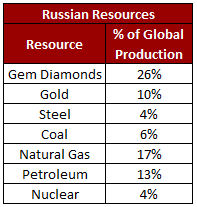
Baron Rothschild’s perspective rings true in this market: “The time to buy is when there’s blood in the streets.”




